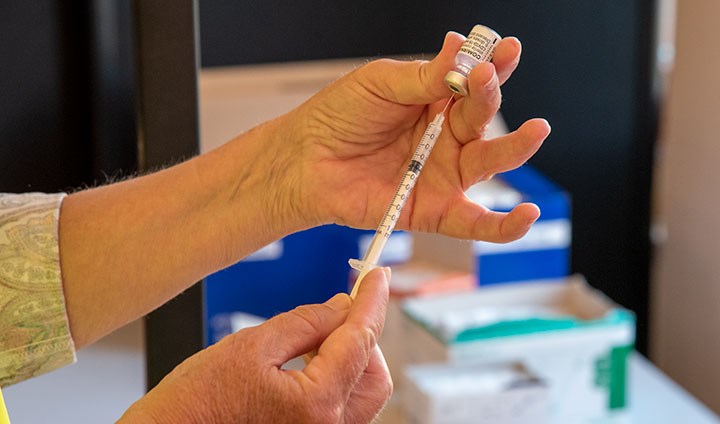Vice-Chancellor’s blog: “Vaccines are what society has to offer against COVID-19”

One of all the syringes filled with the vaccine from Region Örebro County at a temporary vaccination clinic at Örebro University. There is an additional on-campus drop-in vaccination scheduled. Photo: Jesper Mattsson
This was the message from Johan Carlsson, Director-General of the Public Health Agency of Sweden, to Sweden’s government authorities during a Zoom meeting on Tuesday evening.
This, on the same day that the government announced that most of the restrictions will be lifted on 29 September.
The lifting of restrictions means that more people will meet in a variety of contexts.
The unvaccinated then have a significantly increased risk of getting sick and burdening the healthcare system.
Currently, around 80 per cent of those admitted to ICUs are unvaccinated.
Of course, individuals are not cannot be forced to get vaccinated, but I think that we all have a moral obligation to do so.
This view is shared by the Swedish National Council on Medical Ethics (Smer). This week, the Council issued a statement on vaccination against COVID-19 for healthcare professionals. With this statement, Smer wants to highlight the ethical dimension of the issue parallel to the legal and labour law perspectives:
The Council considers that employees with patient / client contact within medical and health care, as well as within health and care services for the elderly and people with disabilities have a moral obligation to get vaccinated against COVID-19. The patient’s / client’s interest in minimising the risk of infection outweighs the employee’s individual choice whether to get vaccinated or not.
Some university employees and students work within healthcare and are directly affected by Smer’s recommendation. I believe that this moral obligation can very well be extended to all university employees and students. In this way, we will fully assume our responsibility as citizens and fellow human beings.
All estimates suggest that the coronavirus will linger in our society for a long time. The basic rules of hygiene and social distancing that we have learned and applied have aided in preventing the spread of infection and disease. But only vaccines can prevent the most severe consequences of the viral infection. So, be sure to take full advantage of the opportunity to get vaccinated, protecting both yourself and vulnerable groups. In this way, we can more quickly and safely return to normal university activities, such as physical meetings and discussions, along with exchanges of knowledge – in real life.
In cooperation with Region Örebro County, we will offer further opportunities for drop-in vaccination on Campus Almby. The next opportunity will be 15 and 16 September – don’t miss it!
Johan Schnürer, Vice-Chancellor
Ps. A tiny group, likely fractions per thousand, should not be vaccinated for medical reasons. This small group, along with a larger group with compromised immune systems, have every right to expect the rest of us to take our social responsibility.
Translation: Jerry Gray
